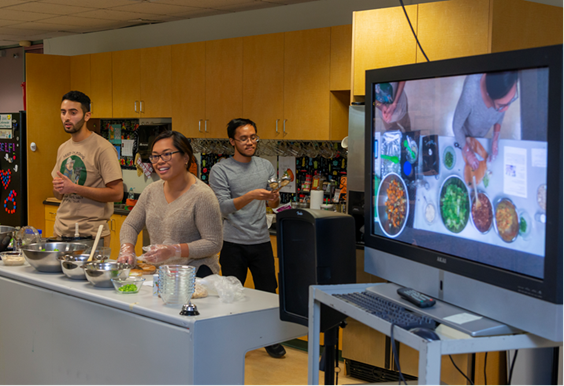Support Page Content
About the Didactic Program in Dietetics (DPD)

Equal Opportunity and Excellence in Education and Employment
The Sacramento State Didactic Program in Dietetics is open and available to all who are interested to apply and/or participate, regardless of race, sex, color, ethnicity or national origin. Consistent with California law and federal civil rights laws, the California State University, Sacramento provides equal opportunity in education and employment without unlawful discrimination or preferential treatment based on race, sex, color, ethnicity, or national origin. Our commitment to equal opportunity means ensuring that every student and employee has access to the resources and support they need to thrive and succeed in a university environment and in their communities.
Program Mission, Goals & Objectives
The mission of the Didactic Program in Dietetics is to produce a diverse population of graduates to become culturally sensitive, competent, valuable, and ethical members of the nutrition, food, and dietetics profession. The program delivers a high-quality curriculum and experiential learning activities and produces graduates prepared for supervised practice leading to eligibility for the Commission on Dietetic Registration credentialing exam to become entry-level registered dietitian nutritionists.
The program will:
Goal 1: Program graduates will be prepared for successful entry into graduate school, supervised practice, or employment in the nutrition, food, and dietetics profession.
Objective Measures:
1.1 At least 80% of students complete program requirements within three years (150% of planned program length).
1.2 At least 60% of program graduates apply for admission to a supervised practice program prior to or within 12 months of graduation.
1.3 Of program graduates who apply to a supervised practice program, at least 60% percent are admitted within 12 months of graduation.
1.4 The program’s one-year pass rate (graduates who pass the registration exam within one year of first attempt) on the CDR credentialing exam for dietitian nutritionists is at least 80%.
1.5 At least 75% of supervised practice directors responding to a survey will rate program graduates’ preparation for supervised practice as “adequate” or better.
1.6 At least 80% of graduates who respond to the post-graduation survey will be enrolled in a supervised practice program or graduate program or employed in a nutrition and dietetics-related field within 12 months of graduation.
1.7 At least 80% of the graduates who respond to the post-graduation survey will rate the program as "adequate" or higher in preparing them for supervised practice, graduate school, or employment.
Goal 2: Program graduates will have a diverse representation and an understanding of cultural humility, diversity, equity, and inclusion.
Objective Measures:
2.1 At least 25% of graduates will be from underrepresented minority groups.
2.2 At least 80% of graduates who respond to the post-graduation survey will indicate that the program prepared them for an understanding of cultural humility, diversity, equity, and inclusion.
Goal 3: Program graduates will be nutrition and dietetics professionals committed to continuing education and service to the profession.
Objective Measures:
3.1 At least 50% of DPD graduates responding to the post-graduation survey will indicate membership in a professional organization.
3.2 At least 50% of graduates responding to the post-graduation survey will indicate having participated in one or more professional activities, including but not limited to continuing education events, workshops, seminars, meetings, professional updates.
Program outcomes data are available upon request.
Admissions and Application Process
Click the link below for information about admissions, including an admissions checklist, planning a campus tour, and meeting with an Admissions Counselor.
Visit the link below to find more information about the application process.

Baccalaureate Degree Requirements (Dietetics Concentration)
Degree requirements fall into the following three categories: major/minor requirements; General Education requirements; and other Graduation requirements, which are subject to catalog rights policy.
A minimum of 120 total semester units are required for graduation; no more than 70 units taken at a community college or other two-year college may be applied to this total. Additionally, at least 39 of the total units must be in upper-division courses.
Dietetics Concentration requires the completion of 82 units. A grade of at least C is required in core prerequisite classes (Bio 10; Chem 1A, 1B; NUFD 9,10,11,113; Stat 1). A grade of C- is required in other upper-division prerequisites, including Chem 20, Bio 131, Chem 161, NUFD 118A. Concurrent enrollment for a major class and its prerequisite class is NOT permissible.
All undergraduate students must complete a minimum of 48 units of General Education requirement and other Graduation Requirements.
Declaring Dietetics Concentration
Current NUFD Majors
You are eligible to declare the Dietetics Concentration after completing NUFD 9, 10, 11, and 113; CHEM 1A and 1B; BIO 10; and STAT 1 with a grade of at least C. Overall GPA must be at least 2.75.
To declare the Dietetics Concentration:
- Complete the Declaring Dietetics Concentration form which includes the Advising Sheet.
- Upload unofficial transcripts from all institutions where the prerequisite courses were taken, including at Sacramento State. Yellow highlight the prerequisite courses in your transcripts.
2nd Bachelors Degree and Postbaccalaureate DPD
We offer a Second Bachelors in Nutrition and Food and students can add Dietetics Concentration after completing the prerequisites. In addition, our Postbaccalaureate DPD pathway has limited seats for our program graduates with Nutrition degree (non-DPD route) or for graduates with nutrition degrees from an accredited U.S. college/university.
More information about 2nd Bachelors Degree and Postbaccalaureate DPD

International Degree Holders
If you have an international degree, you are required to have your coursework evaluated by a foreign degree evaluating agency first. All foreign degree holders are required to attain a Second Bachelor's Degree in Nutrition and Food. Anyone interested in becoming a Registered Dietitian Nutritionist (RDN), will need to declare the Dietetics Concentration after enrolling in Sacramento State. See prerequisites for Declaring Dietetics and how to apply by visiting Second Bachelors Degree and Postbaccalaureate DPD. All foreign degree coursework equivalency will be assessed to determine which courses can transfer to Sacramento State.
The Academy has provided resources and information for international students you might find helpful in order to become an RD and pursue a career in dietetics, including answers to frequently asked questions.
Forms & Resources
Additional forms and resources are available here.